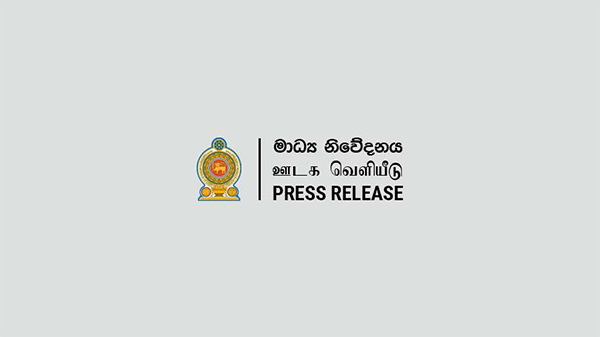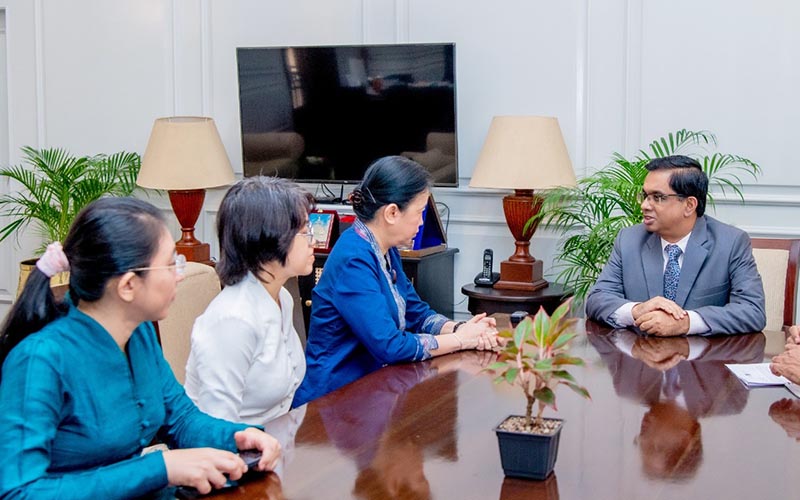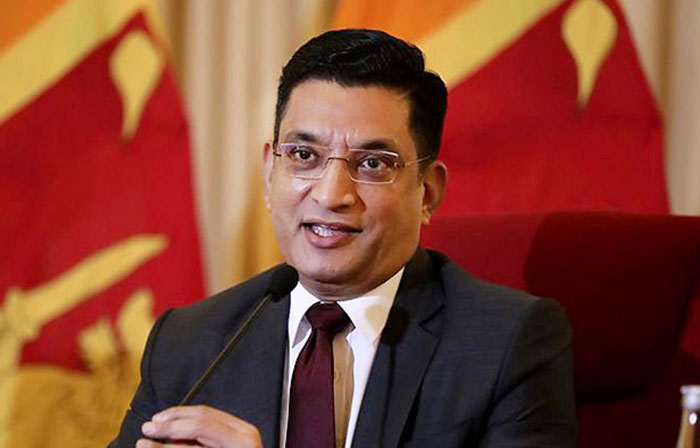News
Slump in imports trigger surge in coconut oil prices

By Suresh Perera
With the drastic drop in imports, coconut oil prices in the market have surged to a new high as local production is grossly insufficient to meet the annual consumption of around 200,000 metric tons, industry officials said.
In 2020, local coconut oil production was a negligible 20,000MT, which translated into a yawning gap that had to be bridged by importing 180,000MT, they said.
“This has been the position over the past few years as dominant imports dwarfed local supplies”, they pointed out.
The ban on the import of palm oil has also compounded the issue as customers will now have to depend wholly on coconut oil resulting in inevitable pressure on the demand curve, they pointed out.
Prices have soared with a 750ml bottle of coconut oil fetching Rs. 550-600 in the local market, they said, while predicting the upward trend to continue due to short supply.
The local production of coconut oil fell by the wayside as high prices of nuts was a challenge to compete with imports, says M. L. D. Niroshana, Director-General of the Coconut Development Authority.
On an average price of Rs. 85 each, it requires nine to ten nuts to extract a litre of coconut oil, and they need to sell a 750ml bottle for around Rs. 500 to make a small profit. However, this was not feasible when imports were available at a more competitive price, he noted.
Earlier, a 750ml bottle of coconut oil was selling at anything between Rs. 320-380. With the slump in imports following the aflatoxins controversy, prices have zoomed as supply can no longer meet the demand, market sources said.
Consignments of palm oil imported before the ban was announced are still available in the marketplace, but after existing stocks are lapped up, there will be more pressure exerted on the demand for coconut oil that’s bound to see prices going through the roof, they warned.
“Market forces are at play because there existed a big gap between imports and local production of coconut oil. With many importers now reluctant to order fresh stocks due to uncertainty over contamination fears, and coupled with the ban on palm oil, the market is grappling with the demand for this essential consumer commodity”, Niroshana outlined.
Sri Lanka’s production in 2020 was 2,760 million nuts, which fell short of the 3,000 million target. The figure was envisaged to reach 3,600 million at peak. During October, November, December and January, there’s a shortage of nuts, but production picks up with an increase in yield during May-August.
“There is neither a short-term solution nor a question of expediting the production process as it takes 10 years for coconut trees to yield. The government grants a subsidy for fertilizer and water to growers in a bid to push up production”, Niroshana elaborated.
As in any business, private millers are also driven by profits. In the short-term, the price of nuts cannot be expected to dip to Rs. 35-45 each for millers to make a margin by selling coconut oil, the Director-General said.
As long as nut prices remain high, local coconut oil will also be costly as they go hand in hand, he pointed out. “More millers will be encouraged to take to extracting coconut oil if imports are limited and market conditions and prices are good”.
On the other hand, the export of copra is more lucrative as prices are attractive in foreign markets. This segment earned an export income of US$ 661 million in 2020, Niroshana further said.
In a bid to mitigate the ballooning prices in the market, the government has permitted only the state-owned BCC Lanka to import desiccated coconut up to a maximum of 13,000MT per month under a Special Commodity Levy (SCL) of one rupee per kilo, industry officials said.
On the recommendation of the Industries Ministry, the consignments will be allowed for a period of three months with effect from April 28, 2021, they said.
The stocks are likely to be imported from Indonesia instead of India because of the raging coronavirus pandemic there, they noted.
According to a Finance Ministry directive, a SCL of Rs. 300 per kilo will be imposed on importers of desiccated coconut.
Retail coconut prices still remain relatively high with each fetching anything between Rs. 85-100 depending on the size, market sources said.
A coconut grower in Nattandiya said the average farmgate price for nuts has now dropped to Rs. 50-55 each. In the case of small nuts, two are sold for the price of an average nut.
He said the average farmgate price was Rs. 75 each about one and a half months ago when retail market prices shot up to Rs. 100-125 per nut.
News
34 new projects under “Clean Sri Lanka” programme this year

Under the guidance of President Anura Kumara Disanayake, the “Clean Sri Lanka” programme, implemented as a key government initiative is set to launch 34 new projects this year, and work on many of these projects is scheduled to commence by the end of this April.
In line with this, a one-day workshop was held on Thursday (10) at the “Clean Sri Lanka” Secretariat located in the Lotus Building at the Temple Trees, under the leadership of Secretary to the President Dr. Nandika Sanath Kumanayake. The workshop provided technical guidance on preparing project proposals in accordance with the formats required by the Department of National Planning for submission and approval.
The “Clean Sri Lanka” programme aims to foster social, environmental and ethical transformation across the country, with the active participation of all stakeholders. A sum of Rs. 5 billion has been allocated from this year’s national budget for its implementation.
Once the Department of National Planning grants approval for the proposed projects, detailed action plans will be developed in line with prescribed formats. It was agreed that projects deemed ready for implementation will commence before the end of April.
During the workshop, Secretary to the President outlined the government’s expectations and the intended outcomes of the “Clean Sri Lanka” programme.
Senior officials representing the Ministry of Public Administration, Provincial Councils and Local Government, Ministry of Foreign Affairs, Foreign Employment and Tourism, Ministry of Health and Mass Media, Ministry of Education, Higher Education and Vocational Education, Ministry of Transport, Highways, Ports and Civil Aviation, Ministry of Public Security and Parliamentary Affairs, Ministry of Agriculture, Livestock, Lands and Irrigation, Ministry of Digital Economy, Ministry of Urban Development, Construction and Housing, Ministry of Environment, Ministry of Industries and Entrepreneurship Development, Sri Lanka Police, and the Western Provincial Council were in attendance.
Also present were Engineer S.P.C. Sugeeshwara, Additional Secretary to the President (Clean Sri Lanka Programme) and G.M.R.D. Aponsu, Senior Additional Secretary to the President (Finance and Economic Affairs), along with other senior officials.
[PMD]
News
Financial assistance of USD 01 Million for the Disaster-Affected People of Myanmar

The Government of Sri Lanka has extended financial assistance amounting to USD 01 Million to provide relief to the people of Myanmar affected by the recent earthquake.
The relevant cheque was officially handed over by the Secretary to the President, Dr. Nandika Sanath Kumanayake, to the Ambassador of Myanmar to Sri Lanka, Marlar Than Htaik.on Thursday (10) at the Presidential Secretariat.
Despite the prevailing economic challenges in Sri Lanka, the Ambassador of Myanmar expressed her deep appreciation to President Anura Kumara Disanayake and the Government of Sri Lanka for this gesture of solidarity and support towards the disaster-stricken people of Myanmar.
Furthermore, the Ambassador extended her gratitude for Sri Lanka’s decision to deploy relief teams and medical personnel during this difficult time. She also noted that such acts of compassion further strengthen the longstanding religious and cultural friendship between Sri Lanka and Myanmar.
The Ambassador also briefed the Secretary to the President on the current situation in Myanmar following the earthquake.
Senior Additional Secretary to the President, Roshan Gamage, along with officials from the Embassy of Myanmar, Winh Wint Khaus Tun and Ms. Lei Yi Win, were also present at this occasion.
[PMD]
News
Indo-Lanka MoUs unlikely to be tabled in Parliament any time soon

…of seven SOCs only one constituted so far
Sri Lanka’s controversial MoU on Defence Cooperation with India was unlikely to be taken up any time soon in Parliament in spite of the House Sectoral Oversight Committee (SOC) on Governance, Justice and Civil Protection that has been assigned defence, authoritative sources told The Island.
Of the seven SOCs only one was activated with the recent election of Dr. Najith Indika, MP, as the Chairman of the Sectoral Oversight Committee on Governance, Justice, and Civil Protection of the Tenth Parliament.
The inaugural meeting of the current parliament was held on 21 Nov., 2024.
Sources said that the parliament had met for the last time yesterday (10) before the Sinhala and Tamil New Year holiday. It is scheduled to meet again on May 8.
The UNDP that has financially backed the establishment of the SOC system to help strengthen the role of the parliament recently reached a consensus with the government to reduce the number of SCOCs from 17 to seven. The Island, in writing, asked for the UNDP’s reaction to the operation of SOCs but had not received a response at the time this edition went to press.
The SOCs have the power to examine any Bill, except the Bills defined in Article 152 of the Constitution, Treaty, Reports including the Annual and Performance Reports relating to the institutions coming under its purview or any other matter referred to the Committee by Parliament or any Committee or a Minister relating to the subjects and functions within their jurisdiction.
Sources said that out of the seven SOCs only one had been activated during the past five months though the government and the Opposition agreed to share the leadership of them.
Accordingly, it was agreed that the government would appoint chairpersons to four SOCs –– Economic Development and International Relations, Health, Media and Women’s Empowerment, Science, Technology and Digital Transformation and Governance, Justice and Civil Protection .
It was also agreed that the Opposition would appoint chairpersons to the SOCs on Infrastructure and Strategic Development, Education, Manpower and Human Capital, and Environment, Agriculture and Resource Sustainability to the Opposition.
India and Sri Lanka on April 5 signed six MoUs on HVDC interconnection for import/export of power, cooperation in the field of sharing successful digital solutions implemented at population scale for digital transformation, defence cooperation, multi sectoral grant assistance for Eastern province, health and medicine and pharmacopoeia cooperation. In addition to them, India, Sri Lanka and UAE signed a tripartite MoU cooperation in development of Trincomalee as an energy hub.
The Island asked Ali Sabry, PC, who served as foreign minister during Ranil Wickremesinghe’s tenure as the President (July 2022 to Sept 2024) whether the seven MoUs had been discussed during that period. We also asked him whether those MoUs should have been discussed at SOCs before finalisation.
Sabry said: “Most of the MOU to my knowledge were discussed except the one on Defence Cooperation, which I am unaware of. General procedure is the relevant line ministry prepares the initial draft and gets the input from the Foreign Ministry and goes for stakeholder consultation of all ministries and agencies involved. Then the President’s Office grants its sanction and with the approval of the AG, it goes before the cabinet of ministers. With Cabinet approval, the government could sign the MOU.”
Sabry said that he was of the opinion that once the government signed a particular MoU, it should be placed before the parliament. “MOU’s are generally not legally binding and only signify the desire to work together. If the signed MoUs were to be implemented, then they have to be followed by agreements or laws.”
He emphasised the pivotal importance of transparency in the whole process. The ex-minister said: “I think transparency is crucial in these matters. Concealment leads to speculation and assumption of the worst. The MOUs should be tabled in Parliament for public information. Discussion at the relevant SOCs would have been helpful. There are growing fears fueled by lack of information in the public domain. This is a private comment, not to be attributed to me.
Asked whether MoUs, particularly the ones on defence and energy had to be approved by the Attorney General, the former minister said that the AG has to advise the MoUs compatibility with the Constitution. “But Article 157 of the Constitution does not apply; the 2/3 majority stipulated there envisages only investment treaties.” Foreign Minister Vijitha Herath assured Parliament on April 8 that the AG had cleared all seven MoUs and none of them were inimical to the country.
By Shamindra Ferdinando
-

 Business4 days ago
Business4 days agoColombo Coffee wins coveted management awards
-

 Business6 days ago
Business6 days agoDaraz Sri Lanka ushers in the New Year with 4.4 Avurudu Wasi Pro Max – Sri Lanka’s biggest online Avurudu sale
-

 Features5 days ago
Features5 days agoStarlink in the Global South
-

 Business6 days ago
Business6 days agoNew SL Sovereign Bonds win foreign investor confidence
-

 Features2 days ago
Features2 days agoSri Lanka’s Foreign Policy amid Geopolitical Transformations: 1990-2024 – Part III
-

 Features5 days ago
Features5 days agoModi’s Sri Lanka Sojourn
-

 Midweek Review2 days ago
Midweek Review2 days agoInequality is killing the Middle Class
-

 Features4 days ago
Features4 days agoSri Lanka’s Foreign Policy amid Geopolitical Transformations: 1990-2024 – Part I










